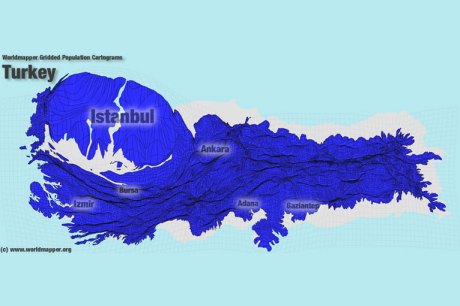Population Maps
2 October 2009
Friday

The BBC has brought my attention to some interesting maps. I wrote about maps previously in A Theory of Maps, while in Epistemic Space I wrote about the relationships between maps and knowledge. A map, like a book or a website, is a particular way of encoding information. One can manipulate the conventions of encoding information and arrive at novel maps.
The BBC has a couple of stories about maps encoding population information, People-powered maps, as well as “In Pictures: People-powered maps”. The BBC story also references the Worldmapper web page. I encourage to reader to take a look at these resources. The larger maps on the BBC “In Pictures” features makes it possible to better appreciate the images.
The above map of Turkey skews physical geography according to population. This shows an immediate, intuitive relation between life and landscape. Finding novel ways to visually present quantitative information both extends our knowledge and makes that knowledge intuitively accessible in a way that was not previously accessible to us. And at a time when knowledge is increasing exponentially, we need novel and creative ways to assimilate this knowledge or we will not be able to make use of it. The future of technological civilization is at stake.
That last sentence — the future of technological civilization is at stake — is a dramatic claim. What do I mean by it? Well, everyone has heard the colloquial term “information overload.” We are in danger of being bombarded with so much information that we can’t take it all in. But technological, quantitative civilization proceeds by continuously adding to our stock of knowledge and moreover systematically exploiting this knowledge by applying science to technology. If, in a quasi-Malthusian moment, our knowledge outruns our ability to make technological use of that knowledge, our civilization will stumble — or worse.
We’ve all heard stories about, or seen for ourselves, the technological prowess of youth. The older generation struggles to master a few features of their cell phones while the younger generations are running technological circles around their elders. It pretty much needs to be like this if our technological advances are to continue. The skills of living with high technology need to be mastered early so that the next generation can not only use these devises but build on them and go beyond them. Partly this is possible because of the falling away of old technologies that become of merely antiquarian interest. It is also possible because of the parallel continuing improvement of social technologies that allow people to rapidly learn about the changing technological world around them. The more readily knowledge can be assimilated, the more readily it can be transcended. All the technological knowledge we have today will have to be transcended in its turn for civilization to continue its development. This is a tall order.
. . . . .


